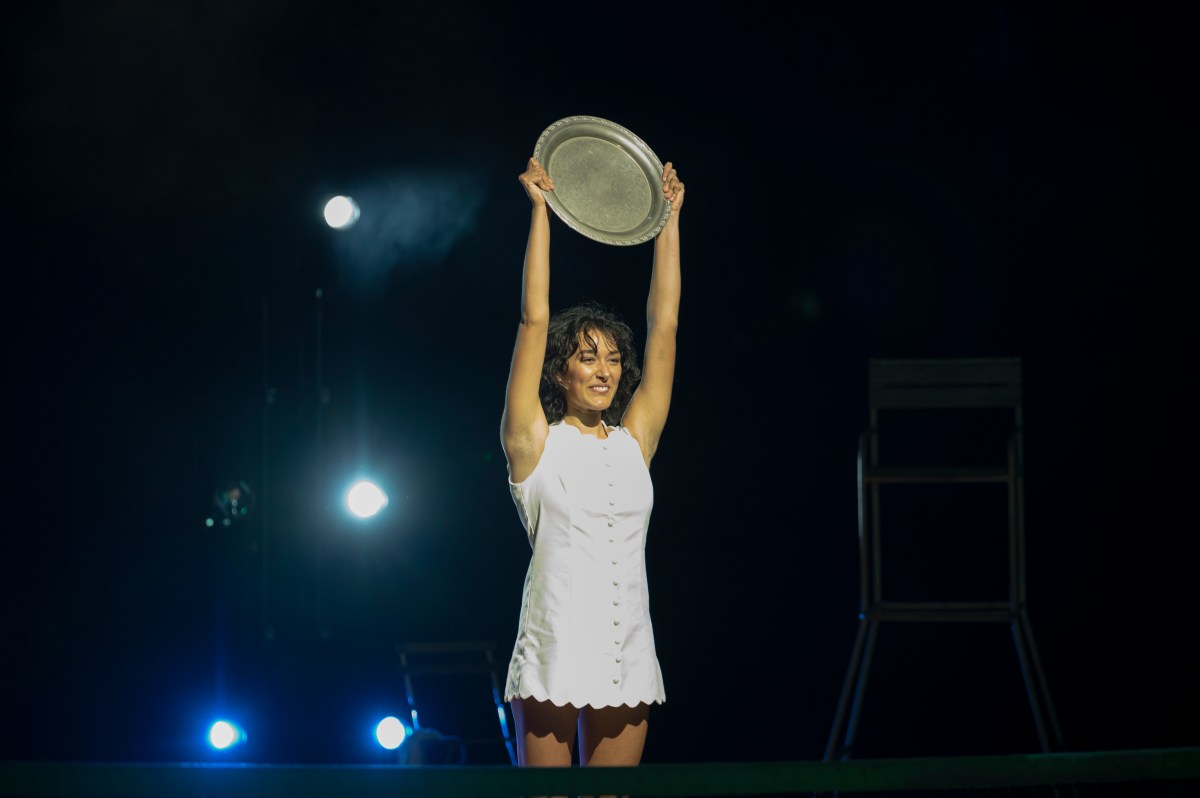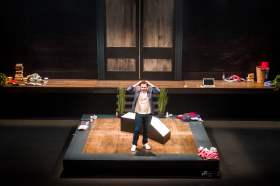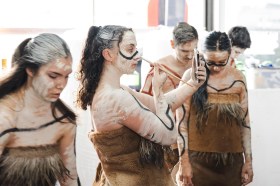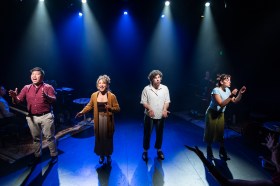‘Sunshine Super Girl’ was one of many nicknames bestowed upon tennis champion Evonne Goolagong by the endlessly fascinated local and international press.
Yorta Yorta/ Gunaikurnai playwright Andrea James’s biographical play charts Goolagong’s journey to fame, from her hometown tennis club in Barellan to the hallowed ground of Wimbledon Centre Court.
Along the way, she meets tennis heroes and her future husband (the super girl is later dubbed ‘Super Mum’), endures discrimination and family tragedy, and becomes embroiled in controversy over her participation in a 1972 segregated tournament in South Africa. Hers is a fascinating life story, now brought to the stage in James’ warm, thoughtfully crafted adaptation.
Ella Ferris takes on the role of Evonne Goolagong, capturing her effervescent grace with ease. Ferris is supported by a strong ensemble of First Nations artists who fill out Goolagong’s world with a host of colourful characters: friends and family, media personnel, sporting rivals, Barellan locals – even a row of sheep waiting to be shorn by skilled shearer Ken Goolagong.
Each ensemble member is also given a few central recurring characters. Kirk Page is ambitious coach Mr Edwards, Lincoln Elliott plays a smitten Roger Cawley, Jax Compton is Evonne’s protective mother, and Katina Olsen floats above the stage as the silent, lofty figure of Margaret Court.
The stage is set up as a tennis court for the entirety of the play. When is it not being used in recreations of career-defining matches, its simple elements are easily adapted. Metal benches pushed together become the Goolagong family’s rickety old car, and tall umpire chairs serve as secluded fishing spots or airplane seats. Ubiquitous tennis whites act as a useful blank canvas; quick character changes can be denoted by the addition or removal of a jacket, or a pair of sunglasses.
Clothes are also used to mark key moments in Evonne Goolagong’s journey, such as her iconic scalloped tennis dress designed by Ted Tinling, or a pair of over-the-knee boots she proudly dons to dance the night away after victory at Wimbledon.
Dance elements feature strongly throughout Super Sunshine Girl, whether in scenes at the Wimbledon Champions Ball or social dances back home, or in the lyrical, highly choreographed sequences used to represent play in tennis matches. Even when the characters are not dancing, seamless movement underpins the structure of the play.
Read: Book review: The Coast, Eleanor Limprecht
Scenes flow from one to the next, settings shift, and the actors change from character to character, all seemingly without pause. The result is a continuous, absorbing piece of theatre, held together by a constant stream of first-person narration from beginning to end by Ferris as Goolagong.
If this tell-don’t-show narrative device is sometimes relied on a little too heavily, it is nevertheless an impressive feat, which Ferris carries off with barely a hitch.
Sunshine Super Girl is an engaging portrait of both an Australian sporting icon and a pivotal period of history. Beautifully staged and lovingly performed, it is a fitting tribute to Evonne Goolagong’s legacy.
Sunshine Super Girl
State Theatre Company South Australia
Writer and Director: Andrea James
Set and Costume Designer: Romanie Harper
Lighting Designer: Karen Norris
Composition and Sound Design: Gail Priest
Original Choreographic Concept and Initial Movement Direction: Vicki Van Hout
Movement Director and Additional Choreography: Karen Olsen
Video Media Designer: Mic Gruchy
Dramaturg: Louise Gough
Cast: Jacqueline Compton, Katina Olsen, Lincoln Elliott, Ella Ferris, Kirk Page
Sunshine Super Girl will be playing until 17 September 2022 in Adelaide.
It’s currently playing at Southbank Theatre in Melbourne until 14 December 2022.





